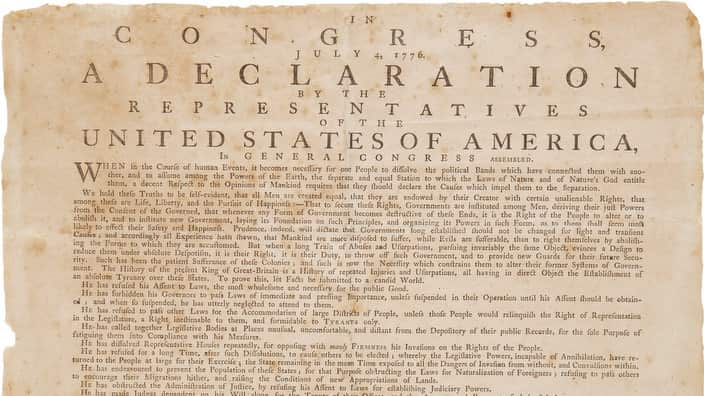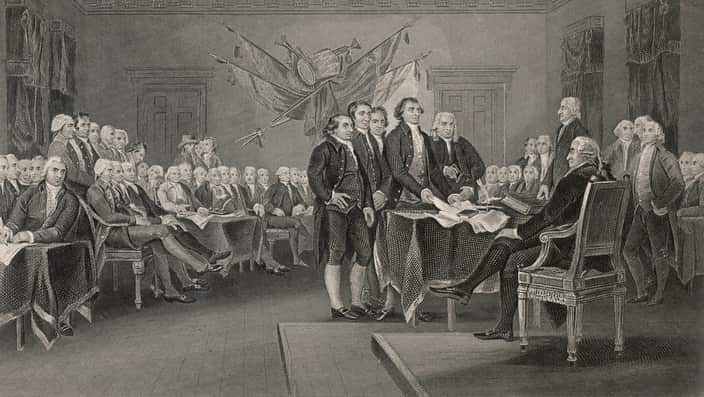Facebook has apologised after algorithms ruled parts of the US Declaration of Independence were hate speech.
To mark Independence Day on July 4, a Texas-based community newspaper shared a series of passages from America's founding document, the Declaration of Independence from 1776.
Managing editor of the Liberty-based Vindicator, Casey Stinnett said he wanted to give readers an opportunity to read the document by posting daily snippets right up until July 4.
Written by Thomas Jefferson, the Declaration justified the independence of the US by listing colonial grievances against King George III, the king of England at the time.
The letter explained why America needed to break away from the motherland and outlined more than 25 acts of tyranny.

One of the passages, however, was flagged as offensive content by Facebook, considered to be violating the company's standard on "hate speech".
A spokesperson for Facebook confirmed to SBS News the post was removed in error and has now since been restored.
"The post was removed by mistake and restored as soon as we looked into it. We process millions of reports each week, and sometimes we get things wrong.”
Mr Stinnett said the passage that triggered the notice from Facebook contained the words 'Indian Savages'.
In paragraphs 27-31, Jefferson writes about Native Americans: "He has excited domestic insurrections amongst us, and has endeavoured to bring on the inhabitants of our frontiers, the merciless Indian Savages, whose known rule of warfare, is an undistinguished destruction of all ages, sexes and conditions," the Declaration's text reads.
In a post on the Vindicator's website, Mr Stinnett took issue with Facebook's algorithm and automated methods for detecting offensive posts, saying it ignored historical context.
"This is frustrating, but your editor is a historian, and to enjoy the study of history a person must love irony. It is a very great irony that the words of Thomas Jefferson should now be censored in America," he wrote.
He also criticised the lack of an option to appeal Facebook's decisions.
"It does not appear the folks at Facebook want anyone contacting them. Or, at least, they do not make it easy," Mr Stinnett wrote.
Mr Sttinnett said he did eventually receive a statement from Facebook apologising for the error.

“It looks like we made a mistake and removed something you posted on Facebook that didn’t go against our Community Standards. We want to apologize and let you know that we’ve restored your content and removed any blocks on your account related to this incorrect action," Facebook's statement read.
The organisation also publicly apologised on the Vindicator's Facebook page, prompting an effusive thank you message from the newspaper itself.
In a post dated June 27, 2017, the company said it "deleted around 66,000 posts reported as hate speech per week".
Facebook said there was room for error, however, in their flagging system - saying decisions were made based on context and intent.
"But it’s clear we’re not perfect when it comes to enforcing our policy," Facebook's Richard Allan wrote.
"Often there are close calls - and too often we get it wrong."
It is not the first time that Facebook's algorithm for content moderation has been accused of censorship.
In 2016, a columnist for The New York Daily News, Shaun King, found himself banned from Facebook for 24 hours over an email he posted.
The screenshot showed the type of hate mail he received where he is targeted with racial slurs, including the f- and n-words, for his writing on the Black Lives Matter movement.
Also in 2016, Facebook removed an iconic Vietnam war photo featuring a naked girl, saying "it’s difficult to create a distinction between allowing a photograph of a nude child in one instance and not others".
Facebook's Vice President of Global Policy Management, Monika Bickert, on April 24 announced a plan to "build out the ability for people to appeal our decisions".
Part of that would include a mechanism for users to request a review into censorship decisions.

